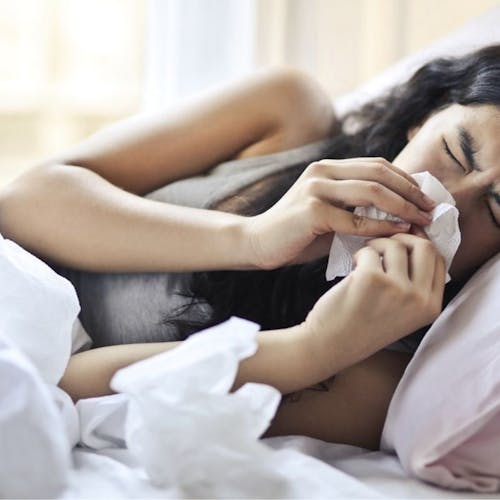This website uses cookies to enhance the user experience. By using Yoppie you are agreeing to our use of cookies.
The COVID Vaccine & Your Period: Essentials To Know
Written by Yoppie
28 Apr 2021
Firstly, which vaccine are we talking about?
Are the COVID-19 vaccines causing menstrual irregularities?
Can vaccines affect fertility?
Is it safe for pregnant people to receive a COVID-19 vaccine?
Are vaccines safe for breastfeeding mothers?
So should I have a vaccine or not?
Since the vaccine programme in the UK was first announced it has dominated the headlines and infiltrated all our conversations. Needless to say, it’s a light at the end of the tunnel. But as with any new vaccine, people have questions.
Some are centred around how the vaccine affects your menstrual cycle, fertility and pregnancy, so we think now is a good time to give you the facts as they currently stand, to help you decide what might be best for your personal circumstances.
Disclaimer: All information in this blog has been taken from reputable sources like the NHS and World Health Organization, but please be aware that information on COVID-19 and vaccines is always being updated, so we recommend looking to the WHO website for the most up-to-date info.
Firstly, which vaccine are we talking about?
There are multiple vaccines available, and you may be offered a specific one depending on where you live in the world. The most common here in the UK are the Oxford-AstraZeneca vaccine, the Pfizer/BioNTech vaccine, and the Moderna vaccine. Each vaccine has differing technologies, so there may be more or less data available for some than others.
Are the COVID-19 vaccines causing menstrual irregularities?
This is a rumour that, understandably, people who have periods are curious to know more about. It’s true that a small number of people have noted changes in their periods and monthly cycle after receiving the vaccine, and it’s fair to wonder if this could be connected. So far though, it looks like this is anecdotal evidence, and there’s no data linking any of the vaccines to menstruation changes.
Researchers at Yale School of Medicine said that “even if there is a connection, one unusual period is no cause for alarm.” It has been noted that any menstrual irregularities that come after someone has been vaccinated can be viewed as a side effect similar to that of a fever. It’s a sign that the immune system is being activated, and the body is learning to fight off infection - go body go!
Just like the flu can throw off your menstrual cycle while your immune system fights back, the vaccine could do this too. Or it might not. At the end of the day, catching the COVID-19 virus itself can cause changes to your menstrual cycle, so if this is something you worry about, it would seem there’s less chance of this happening if you are vaccinated.
TL;DR: Some people have noticed changes in their periods/cycles, but this is likely due to the immune system activating after having the vaccine. There is currently no evidence to suggest it’s a problem.
Can vaccines affect fertility?
Heard a rumour that the COVID-19 vaccines affect fertility? This has now been widely noted as false information, but it’s understandable that if you plan on having a child in the future, you will want to know more about this.
While data is limited in this area, the NHS states that there is no evidence to suggest the vaccines affect fertility, and there is no need to avoid trying to get pregnant after you receive a vaccination. The Centers for Disease Control and Prevention (CDC) backs this up, stating that there is currently no evidence that any of the COVID-19 vaccines cause fertility issues.
TL;DR: Data is limited, but the general consensus seems to be that there is no reason the vaccine would affect fertility.
Is it safe for pregnant people to receive a COVID-19 vaccine?
Data on vaccinations and pregnancy is still limited, largely because those who are of reproductive age are one of the last groups to be vaccinated. The World Health Organization says that although there is “very little data” to assess vaccine safety in pregnancy:
“Based on what we know about these vaccines, we don’t have any specific reason to believe there will be risks that would outweigh the benefits of vaccination for pregnant women.”
The Gov.uk website also states that:
“The Joint Committee on Vaccination and Immunisation (JCVI) has advised that pregnant women should be offered COVID-19 vaccines at the same time as people of the same age or risk group.”
[Note that the above excerpts are accurate as of 30th April 2021]
This is likely because according to the CDC, pregnant people who contract COVID-19 are at an increased risk of severe illness from it, compared with non-pregnant people.
Though the advice leans towards getting the vaccine when you are offered it, it’s understandable that if you are pregnant you could be worried about any risks to your child and to yourself.
It may be helpful to know that in the US, around 90,000 pregnant women have been vaccinated primarily with the Pfizer/BioNTech and Moderna vaccines, with no safety concerns being identified. For this reason, the Pfizer/BioNTech and Moderna vaccines are now seen as the preferred choice for pregnant people.
In addition, the Harvard Health Blog shared that at the time of writing, the CDC is tracking over 30,000 vaccine recipients who were pregnant at the time of vaccination. Almost 1,800 have provided details of their symptoms and outcomes, and results so far show that pregnant people appear to have the same vaccine side effects as everyone else, and no miscarriages, stillbirths, or preterm births linked to the vaccines have been reported.
Although the limited data currently shows little risk, it doesn’t give much information on the future health of both the mother and child, and the CDC states that most pregnancies reported are ongoing, so more follow-up data is needed for people vaccinated before or early in pregnancy. They will be continuing to follow people vaccinated during all trimesters of pregnancy to understand effects on pregnancy and babies.
TL;DR: Long term data on vaccinated pregnant people is limited but ongoing. So far no issues have been reported, and sources like CDC and WHO give no recommendations against taking the vaccine while pregnant. Weigh up the risks/benefits based on personal circumstances like age and medical history, and speak to you GP if you have questions.
Are vaccines safe for breastfeeding mothers?
If you’re a new mum, it’s normal to be concerned about whether having a vaccine could affect your child while breastfeeding. Again, data is limited on this, but the World Health Organization states on their website:
“It is not yet clear whether COVID-19 vaccines can be excreted through breastfeeding. To determine the best course of action, the developmental and health benefits of breastfeeding should be considered along with the mother’s clinical need for immunization against COVID-19. WHO does not recommend discontinuing breastfeeding after vaccination.”
It seems this may be a case of the benefits of breastfeeding outweighing any risks, which is backed up by the NHS, who say you can have a COVID-19 vaccine if you're breastfeeding. They state that “the vaccine cannot give you or your baby COVID-19”, and according to the CDC, the Pfizer/BioNTech and Moderna vaccines are mRNA vaccines, so they do not contain the live virus that causes COVID-19, and therefore cannot give someone COVID-19.
mRNA vaccines are designed to cause cell mutation, which is why people are concerned about collecting ongoing data to determine the long-term effects. That said, they don’t interact with DNA or cause genetic changes, as the mRNA doesn’t enter the nucleus of the cell where DNA is kept. None of the major health bodies have recommended discontinuing breastfeeding, and don’t currently have any data to suggest it poses a risk.
The NHS does recommend speaking to your healthcare professional before having a vaccination to discuss the risks and benefits, so don’t be afraid to do this. Any concerns you have are valid, and your GP or nurse can tell you more.
TL;DR: More data is needed on the effects of breastfeeding after being vaccinated. As it stands, the NHS, WHO and CDC all state that they do not recommend discontinuing breastfeeding after having a vaccine. Weigh up the risks and benefits, and speak to your GP for more advice.
So should I have a vaccine or not?
The decision is entirely yours. Everyone’s circumstances are completely different, and with data still being collected on many of the issues raised above, it’s important that you take into account key factors like:
- Your age group: this will determine your COVID-19 risk level
- Your personal health: your own health conditions may put you in a higher/lower risk category, so the risks and benefits will be different for you than for others
- The latest data: the above is true as of April 2021, but of course things move fast! By the time you are invited to have your vaccination, you may wish to check the most up-to-date advice to make sure it is right for you
TL;DR: Stay up to date with the latest information and data given by trusted sources, consider your personal circumstances and health concerns, and do what feel is right to you. If you would like more info, reach out to your GP or nurse for the latest recommendations.
Do you have any questions about COVID-19 vaccines in relation to periods? The Yoppie team are by no means experts on vaccines, but we can hopefully point you towards the information you’re looking for. Shout out in our private Facebook group or drop us a note on Insta @itsyoppie. Don't forget that our personalised period box can get organic tampons, PMS supplements and more delivered easily and regularly through your letterbox, so that's one less thing to worry about if you're still in lockdown or need to self-isolate.
Section jump
Back to top
Subscribe To Our Newsletter
YOPPIE





© 2026 Yoppie is a registered trademark of Phlo Technologies Ltd.
Yoppie's supplements are not a substitute for a varied diet and healthy lifestyle and are not intended to diagnose, treat, or cure any disease. If you are pregnant, breastfeeding, have a medical condition or are under medical supervision, please consult with your doctor before taking any of our products.






